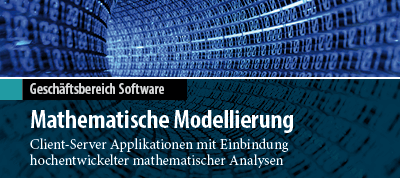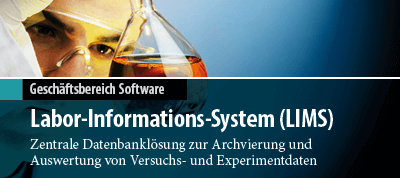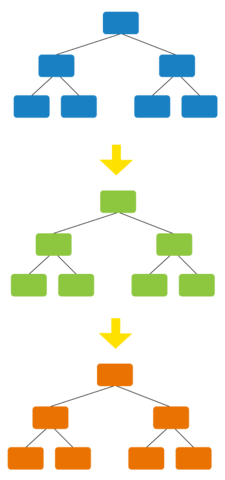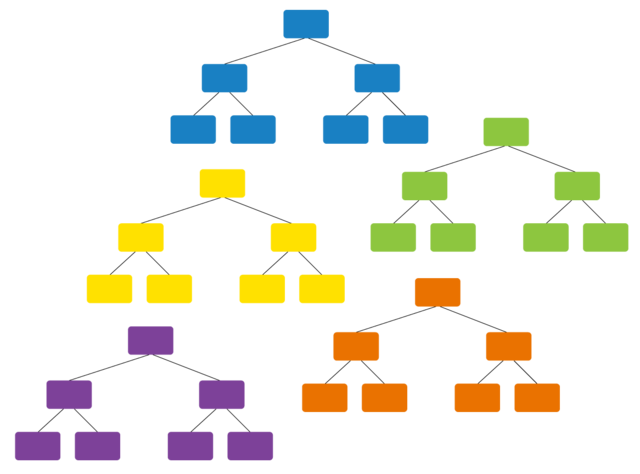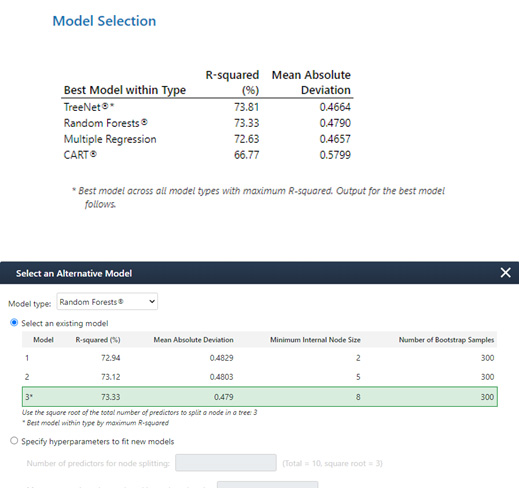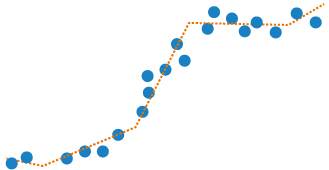Predictive Analytics – Additional, Chargeable Module
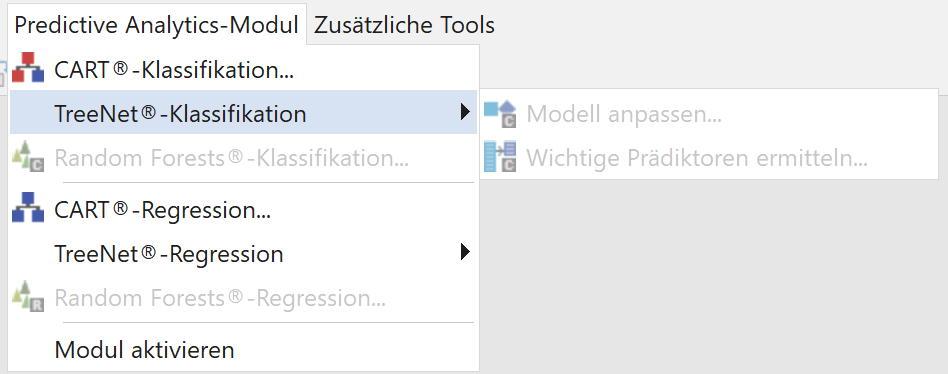
The Predictive Analytics Module in Minitab shows additional chargeable functions with gray background.
Minitab users can purchase the Predictive Analytics module to extend the CART technology already available in Minitab for all users by the algorithms TreeNet®, Random Forest® and MARS®.
TreeNet and Random Forest are two proprietary, tree-based algorithms for machine learning and use some IF-THEN rules to make predictions from one or several decision trees. Compared to linear models like regression, tree-based methods can map nonlinear relations very well and handle fuzzy data that other methods simply cannot deal with. Besides quick answers that are saving time, tree-based methods offer high accuracy and easy interpretability.
The automated Machine Learning (AutoML) helps users to select the model best suited from the available CART (Classification and Regression Trees) methods, TreeNet and Random Forest. Users can opt to compare different models and, if required, select another model.
The MARS® modeling engine is ideal for users who prefer results in a form similar to traditional regression while capturing essential nonlinearities and interactions. The MARS methodology's approach to regression modeling effectively uncovers important data patterns and relationships that are difficult, if not impossible, for other regression methods to reveal. The MARS modeling engine builds its model by piecing together a series of straight lines with each allowed its own slope. This permits the MARS modeling engine to trace out any pattern detected in the data.

The Predictive Analytics Module in Minitab shows additional chargeable functions with gray background.
TreeNet® (Gradient Boosting)
TreeNet is a powerful tool of the modern machine learning class of algorithms, generally called stochastic gradient boosting. This method was developed by Jerome Friedman at Stanford University and is known for its high predictive accuracy. The secret is in the way of how a model is created: With each iteration a small tree is added to the existing tree ensembles to correct the combined errors of the ensembles.
By using various loss functions, the process can be precisely adjusted to certain tasks in predictive modeling, e. g. with the least-squares regression, robust regression, classification etc. In order to support model interpretation, TreeNet goes one step furtherand generates different 2D and 3D plots to explain the dependency of the response variable on the model input. The model is flexible enough to recognize and take into account different nonlinear relations and interactions with multiple factors automatically. Users can optimize model interactions by using further controlling elements to fulfill certain design goals.
Excellent Accuracy
The TreeNet modeling module has a degree of accuracy that, usually, could not be achieved with a single model or ensembles, like bagging or conventional boosting. The TreeNet method is robust against data errors and does not require time-consuming preparation of data, pre-processing or imputation of missing values. With other methods, data errors can be challenging for conventional data mining and disastrous for conventional boosting. In contrast, the TreeNet model is immune to such errors, because data that deviates too far from the existing model or is contaminated by wrong target labels is dynamically rejected.
Interaction Detection
The interaction detection determines if interactions of any kind are needed in a predictive model, and serves as a search engine specialized to detect the needed interactions. The system of interaction detection not only supports improving model performance (often enormously), but also detecting valuable new segments and previously undetected patterns.
Random Forests®
The Random Forests modeling engine creates a collection of hundreds of independent CART® trees. The sum of the predictions made by decision trees determines the forest’s overall prediction. The strengths of Random Forests include detecting outliers and anomalies in data, displaying the proximity of clusters, predicting future results, identifying important predictors, detecting data patterns, replacing missing values by imputation, and providing meaningful graphs.
Cluster and Segmentation
Many insights gained with the help of Random Forests are generated by methods that are applied after growing the trees and contain new technologies to identify clusters or segments in the data and new methods to sort the variables according to their importance.
Robust Variable Importance
Random Forests uses new methods to sort predictors according to their importance. This is useful if data contains thousands or even hundreds of thousands of variables or predictors, exceeding the capacity of conventional regression and classification trees by far. Random Forests can handle these extreme situations and recognize which variables should be used for further analysis. The robustness and quality of these results will be increased by multiple rounds of sampling.
Automated Machine Learning (AutoML)
To find the algorithm best suited for one’s own predictive analyses, usually all models must be created and compared to each other. Thanks to the automated machine learning, in short AutoML, Minitab does this for users.
AutoML evaluates the methods TreeNet, Random Forest and CART (Classification and Regression Trees). By applying criteria, the best model is selected and displayed. Then, users have the flexibility to compare available model types and to simply select an alternative.
MARS®
The MARS regression modelling approach uncovers important data patterns and relationships that are difficult or impossible to see with other regression methods. The MARS modelling module creates models by assembling a series of straight lines, each with its own slope. This allows the MARS modelling module to represent all patterns detected in the data.
High-Quality Regression and Classification
The MARS Model is designed to predict numeric outcomes such as the average monthly bill of a mobile phone customer or the amount that a shopper is expected to spend in a web site visit. The MARS engine is also capable of producing high quality classification models for a yes/no outcome. The MARS engine performs variable selection, variable transformation, interaction detection, and self-testing, all automatically and at high speed.
High-Performance Results
Areas where the MARS engine has exhibited very high-performance results include forecasting electricity demand for power generating companies, relating customer satisfaction scores to the engineering specifications of products, and presence/absence modeling in geographical information systems (GIS).
We will be happy to discuss the Minitab Predictive Analytics with you or to prepare a quote for you. Just give us a call at +49 6032 34956 - 30 or send us an








